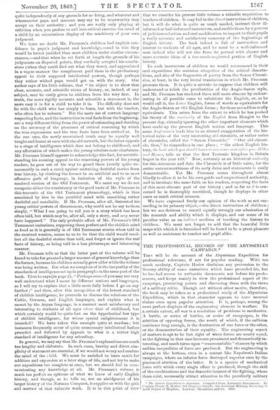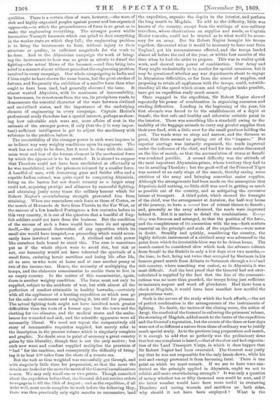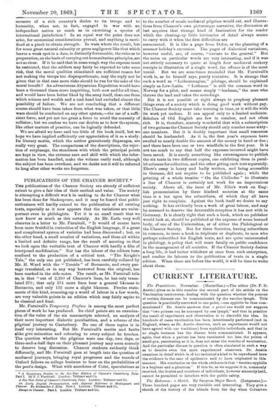THE PROFESSIONAL RECORD OF THE ABYSSINIAN CAMPAIGN.*
THIS will be the account of the Abyssinian Expedition for professional reference, if not for popular reading. With too much modesty, Captain Hozier disclaims any pretension to the literary ability of some narratives which have preceded his, but he has had access to authentic documents not before his prede- cessors, and keeps mainly in view the professional aspect of the campaign, presenting points and discussing them with the views of a military critic. Though not without other merits, therefore, the book may be taken as a professional study of the Abyssinian Expedition, which in that character appears to have unusual claims even upon popular attention. It is, perhaps, among the most perfect displays of the engineering element in warfare. To a certain extent, all war is a resolution of problems in mechanics. A battle, or series of battles, or series of campaigns, is the attrition of opposing forces, the result of which, if the collision continues long enough, is the destruction of one force or the other, or the demonstration of their equality. The engineering aspect of matters is apt to be lost sight of when forces are nearly equal, as the fighting in that case becomes prominent and dramatically in- teresting, and much turns upon " unaccountable " chances by which sudden inequalities of force are produced. But the engineering is always at the bottom, even in a contest like Napoleon's Italian campaigns, where an inferior force destroyed superior ones by the piecemeal attrition of the latter. It is a species of mechanical force with which every single effect is produced, though the skill of the combinations and the dramatic interest of the fighting, where these exist, necessarily attract attention to the peculiarly military • The Brsh E.rpedition to Abyssinia. Compiled from Authentic Documents. By Captain Henry M. Hozier, 3rd Dragoon Guards, late Assistant-Military Secretary to Lord Napier of Magdale. London: Macmillan and Co. 1865. qualities. There is a certain class of wars, however,—the wars of rich and highly-organized peoples against poorer and less organized opponents,—in which the preponderance of force is so great as to make the engineering everything. The stronger power wields locomotive Nasmyth hammers which can grind to dust everything in the weaker state on which they fall ; the engineering problem is to bring the instruments to bear, without injury to their structure or quality, in sufficient magnitude for the work to be done. And in the Abyssinian campaign the work of bring- ing the instruments to bear was so great as utterly to dwarf the fighting—the actual blows of the hammer,—and thus bring into relief in a manner almost without precedent the engineering problem involved in every campaign. Our whole campaigning in India and China ought to have shown the same lesson, but the great strokes of fortune, and frequently the exhibition of a smaller force than what ought to have been used, had generally obscured the issue. It almost wanted Abyssinia, with its maximum of inaccessibility, its barrenness, its remoteness from the sea, its precipitous roads, to demonstrate the essential character of the wars between civilized and uncivilized states, and the importance of the underlying element of engineering in every campaign. Captain Hozier's professional study therefore has a special interest, perhaps as show- ing how calculable such wars are, mere affairs of cost in the estimate of the stronger power, if only (but the if is very impor- tant) sufficient intelligence is got to adjust the machinery with reference to the problem before it.
The irresistibility of the stronger power in such wars imposes in an indirect way very weighty conditions upon its engineers. The work has not only to be done, but it must be done with the mini- mum wear and tear of the human element in the mechanical force by which the opponent is to be crushed. It is absurd to suppose that Theodore could not have been annihilated as effectually as he was annihilated, and the prisoners released by a smaller force. A handful of men, with Armstrong guns and Snider rifles and a capable Indian colonel, was quite equal to conquering Abyssinia, living on the barren but not desert country as a larger army could not, acquiring prestige and alliances by successful fighting, and obtaining justly many times the military honour which Sir Robert Napier's overwhelming strength prevented him from attaining. When one remembers such feats as those of Cortes, or the march of Hernando de Soto from Florida to the Far West, or the success of a few hundred Portuguese a few centuries before in this very country, it is out of the question that a handful of Eng- lish soldiers could not have done the business. But the condition of the success of such a force would have been its not sparing itself,—the piecemeal destruction of any opposition which its small size would have tempted,—a proceeding which would neces- sarily have involved some waste. A civilized and rich power like ourselves feels bound to avoid this. The case is sometimes put as if the whole object were to avoid risk, but risk or not, our humanity would not have tolerated the spectacle of a small force, enduring heroic sacrifices and losing life after life, all to save us who were at home and at ease another penny or two of the income-tax. Hence, the necessity of multiplying the troops, and the elaborate commissariat to enable them to live in an empty country. In the matter of this commissariat, again; there is another weighty condition. The force must not only be supplied, subject to the accidents of war, but with almost all the perfection of comfort attainable in healthy barracks,—certainly with all the appliances of a hunting expedition on which men go for the sake of excitement and roughing it, but still for pleasure. The actual fighting tools might not have involved much greater difficulties than the tools of a former age ; but the tents and the clothing for two climates, and the medical stores and the ambu- lances for wounded and sick, and the scientific apparatus were all necessarily liberal. We need not repeat the comparatively old story of innumerable requisites supplied, but merely refer to the description in the present volume which is singularly complete and graphic. No doubt even in point of economy a great country gains by this liberality, though that is not the only motive ; but each new want and comfort supplied multiplies the provision of " fuel " for the machine, and consequently the difficulty of bring- ing it to bear 400 miles from the shore of a remote sea.
But the task as thus weighted was successfully got through, and with singularly little time for preparation, so that the more the details are looked at the more the merit of the General's combinations is seen. We may only recall one or two points. Though consulted about the expedition before that, the General did not receive orders to engage in it till the 18th of August ; and as the expedition, if all weht well, must needs complete its work before the following May, there was thus practically only eight months to reconnoitre, land the expedition, organize the depots in the interior, and perform the long march to Magdala. To add to the difficulty, little was
known of the country, except from the writings of non-military travellers, whose observations on supplies and roads, as Captain Hozier remarks, could not be trusted as to what would be neces- sary for an army. But Sir Robert Napier brought his troops together, discovered what it would be necessary to have sent from England, got his reconnaissance effected, and the troops landed almost all before the end of the year, or within four months of the time when he had the order to prepare. This was in reality quick work, and showed rare power of combination. Our Army and Navy ought undoubtedly to be readier for special occasions, but it may be questioned whether any war departments about to engage in Abyssinian difficulties, so far from the source of supplies, and proposing to retain all appliances with the troops, could, notwith- standing all the speed which steam and telegraphs make possible, have got an expedition ready much sooner.
Once engaged in the expedition, Sir Robert Napier showed repeatedly his power of combination in organizing resources and evading difficulties. Landing in the beginning of the year, his first obstacle was found to be the establishment of a depot at Senafe, the first safe and healthy and otherwise suitable point in the interior. There was something like a standstill owing to the inability of the baggage animals to carry any greater supplies than their own food, with a little over for the small garrison holding the post. The roads were so steep and narrow, and the distance so great, that there seemed no getting out of the "impasse." But superior carriage was instantly organized, the roads improved under the influence of the chief, and food for the mules discovered on the line of march, so that the accumulation of stmes at Senafe was rendered possible. A second difficulty was the attitude of the most important Abyssinian prince, whose territory they had to use in assailing Theodore ; but the good-will of the Prince of Tigre was assured at an early stage of the march, thereby saving some attrition of the army and bringing somewhat easier supplies. Although the arrangements had been made on the assumption that Abyssinia held nothing, no little skill was used in getting as much as possible out of the country, and so mitigating the excessive labour of transport. A third point, which showed the foresight of the chief, was the arrangement at Antalow, the half-way house of the journey, to have a second line of retreat thence to Senafe ; and, generally as the army advanced, the roads were improved behind it. But it is useless to detail the combinations. Every- thing was foreseen and arranged, so that the position of the force, and the completeness of its connection with the sea—both matters essential on the principle and scale of the expedition—were never in doubt. Steadily and quickly, considering the country, the highly delicate instrument of a civilized army was advanced to the point from which its irresistible blow was to be driven home. The march cannot be considered slow which took the advance column from Senaf6 to the Bashilo in only a few days over two months,— the time, in fact, being not twice that occupied by Sherman in his famous grand march from Atlanta to Savannah through a level and rich country, where marching was easiest, as in Abyssinia it was most difficult. And the best proof that the General had not over- calculated is supplied by the fact that the line of the communi- cations was no more than guarded, the troops being just sufficient to maintain respect and ward off plunderers. Had there been a check at Magdala, it would have been manifest how needful the preparations were.
Such is the nature of the study which the book affords,—the art of perfect combination in the arrangements of the instruments of fighting. No doubt, the tactics of the closing scene, the action of Arogi, the conduct of the General in enforcing the prisoners' release, the storming of Magdala, added much to the lustre of the expedition and the General's reputation, but the events of the three or four days were not of so different a nature from those of ordinary war to justify much special study. As to the previous long preparation and march, it is enough to add that so perfectly was the preliminary done that but one complaint is heard,—that of the slow and bad organiza- tion of the Land Transport Corps, in which it does happen that Sir Robert Napier had been overruled. The General may justly say that he was not responsible for the only break-down, while his zeal and energy prevented it from becoming fatal. There is one point on which we must remark. If we are to have wars con- ducted on the principle applied in Abyssinia, ought we not to exhibit still more overwhelming strength ? It was only a question of money whether ten or fifty thousand men could be sent, and if the latter number would have been more useful in overawing Theodore and saving wounds and sacrifices on both sides, why should it not have been employed ? What is the measure of a rich country's duties to its troops and to humanity, when not, in fact, engaged in war with an independent nation so much as in exercising a species of international jurisdiction ? In an equal war the point does not arise, for economical considerations prevail, and anything is sacri- ficed at a pinch to obtain strength. In wars where the result, but for some great natural calamity or gross negligence like that which leaves a weak spot in a dam, is distinctly foreseeable, the rules as to preparation, on the basis of carrying out humanitarian principles, are not so clear. If it be said that in some rough way the expense must be restricted, that the soldiers may fairly be expected to take some risk, that the moral qualities stimulated are sufficient reason for not making the troops too disproportionate, may the reply not be given that in that case more risks should be run for the sake of the moral benefit? An adventurous Abyssinian Expedition would have been a thousand times more inspiriting, both now and for all time, and would have been better liked by the army itself, than one from which science and wealth and a cool head had excluded almost the possibility of failure. We are not concluding that a different course should have been taken from what was taken, or that little wars should be conducted on any other system,—the use of a suffi- cient force, and yet not too great a force to avoid the necessity of collision ; but we confess we have our doubts as to how the system, like other matters of practice, can be logically defended.
We are afraid we have said too little of the book itself, but we hope we have implied sufficiently our appreciation of it as a study. Its literary merits, which the author gratuitously disparages, are really very great. The compactness of the descriptions, the rejec- tion of surplusage, the steadiness with which the principal points are kept in view, the extreme care and skill with which the infor- mation has been handled, make the volume easily read, although the subject has been overdone, and we doubt not it will be referred to long after other works are forgotten.




































 Previous page
Previous page